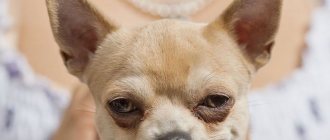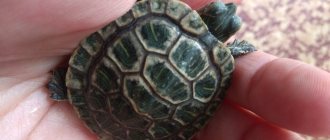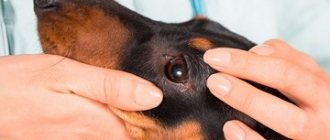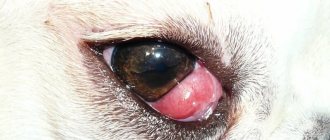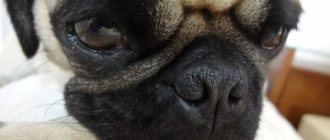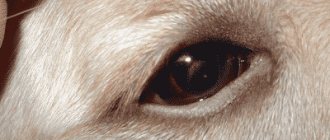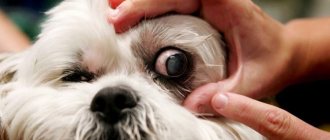When do a puppy's eyes and ears open?
Puppies are born completely blind and deaf. They have no teeth, cannot walk, and are in great need of warmth and care. At the beginning of life, every day of these babies is occupied by sleeping and eating. Only when their eyes open do they get used to it a little and begin to take steps towards an independent life.
Features of opening eyes and ears
How many days after birth do babies begin to see and hear? First, after about a week, the puppies' ears open. At the same time, at first they are able to distinguish only loud sounds. Gradually, day by day, hearing begins to work better.
The eyes open a little later, from the tenth to the fourteenth day. And then, at first, the image is not clear, only light, shadow, outlines and contours of objects are clearly distinguishable. After three weeks, when the pets grow up, their eyes begin to see normally.
Possible complications
Small, recently born puppies are very vulnerable. They need constant supervision and proper care. If after two to four weeks your tiny pet’s eyes and ears do not open, you should pay attention to their condition. This is not always a sign of complications, as it takes longer in some dog breeds.
Sometimes this can be caused by an infection. In such cases, it is advisable to seek help from a veterinarian. In the worst case scenario, puppies may develop entropion of the eyelids, requiring surgical intervention in the eyes. When it comes to hearing, deafness is very difficult to diagnose at an early age. If in doubt, it is better to consult a specialist on the same day.
How and when do puppies' eyes open?
Puppies' eyes, as a rule, open at the age of 10-14 days after birth. In this case, the puppy can open its eyes two to three days earlier or later than the specified period. This is not a deviation or pathology and has absolutely no effect on overall physiological or mental development.
Important! The day the eyelids open in puppies depends on the timing of birth. If the bitch carried puppies, they will open their eyes faster than those born prematurely. However, never try to open the puppies' eyes yourself.
As soon as the time approaches for the puppies to open their eyes, pets need to be protected from bright light. Where the “nest” is located, twilight should reign.
The palpebral fissure begins to open slowly, from the inner to the outer corner. Puppies most often have two eyes open at once, but it also happens that one eye opens a day or two earlier than the other. After the puppy's eyes have opened, assess their condition. If the dog cannot open its eyes due to pain, or the eyelids are stuck together, wash the eyes with warm water and an antiseptic. In general, veterinarians recommend rinsing puppies' eyes after opening them for the next two weeks.
At what age do puppies start walking?
After birth, puppies are not only helpless, but also immobile. The first significant motor activity occurs when the eyes open. From this moment on, they feel more confident and make attempts to get back on their feet. At about three weeks of age, these cubs begin to walk, and after thirty days they are already running.
What to do if the puppy doesn’t go?
Puppies of different breeds, even babies from the same litter, can start walking at different times. There is no need to panic about this. However, if thirty to forty days have passed after birth, and the dog has not started walking, you should think about it. This is the case when it is better not to delay a visit to the veterinarian.
How and when do puppies' eyes and ears open?
Dogs do not develop in parallel, and even if they are born in the same litter, they may not gain hearing and vision at the same time. In this case, it is important to take into account the nuances of the development of each individual individual. Often, the timing of eye opening in young dogs is influenced by the date of their birth. If the cubs are born post-term, they may begin to hear and see earlier than standard time.
On average, the process of acquiring vision takes 10-15 days. It usually starts with a small gap in the inner corner of the eye, which eventually moves to the outer corner. It happens that a gap appears in one of the eyes, and only later does it open completely, and it happens that the whole eye opens at once. The eyes will not always open synchronously - one may open first, and a few days later the other.
We advise you to read: Why does a dog smell?
Opening eyes does not mean good vision; its acquisition occurs after 3-4 days. Although it happens that the ability to see manifests itself on the first day. At the initial stage, the baby can only distinguish between light and darkness, then begins to see the outlines of objects nearby. Full vision in puppies, regardless of breed, usually begins from the 20th day of life.
The eyes appear cloudy and bluish at first, but after a couple of weeks they become clear and clear. Typically, the eyes become darker. In particular, most breeds have dark brown eye color.
In any case, even if the puppy’s eyes have not yet opened within the standard time frame, you cannot open them on your own. This can lead to damage not only to the lacrimal glands, but also to vision in general.
The ears begin to “work” much earlier than the eyesight – at about a week of age. But the full extent of hearing also does not appear immediately. So, at the age of 3 weeks the animal already reacts to loud sounds, and after a week its hearing will become even more acute.
While vision problems are easy to notice, it is much more difficult to understand that a dog has some degree of hearing loss. In any case, if at the age of one month the dog still does not show any reaction to sounds, then it is definitely worth contacting a veterinarian. For example, to test hearing in the earlier stages, you can snap your fingers on the side of the puppy's head or rustle with a plastic bag and track your pet's reaction.
When raising a purebred dog for exhibitions, and also if the owner simply wants to notice all the important stages in the pet’s life, then the date when the puppy’s eyes and ears opened, he should note along with other important dates, for example, the beginning of the use of complementary foods, etc. d.
When do puppies start feeding themselves?
All the little dog needs is his mother's affection and milk. It contains all the necessary elements for the normal growth and development of the puppy. Mom feeds her babies as much as she can. Fourteen days after birth, some dog breeders begin to gradually introduce complementary foods.
When exactly to introduce new food depends on the condition of the puppy itself and how many there are in the litter. However, complete complementary feeding should not be introduced before he has teeth. This usually happens 20-30 days after birth. At this time, their mother begins to regurgitate incompletely digested food for her cubs, accustoming them to adult food.
Feeding recommendations
Complementary feeding for four-legged babies usually begins 21-30 days after birth. The first supplement to breast milk is regular milk, formula, or kefir. Feed the puppies, starting with one type of new food once a day. Gradually the number of times increases until breastfeeding is completely stopped.
From a month on, raw, well-chopped meat is introduced into the diet of a small pet. For the first complementary feeding from natural food, it is better to use beef scraps or minced meat. But it is better to use ready-made food Starter, which is recommended from 3 weeks of age.
By the age of two months, they themselves should eat meat food once a day, and dairy food several times a day. When there are more teeth, you can give him egg yolk, crackers, and drinking water. Then porridge, vegetables, and fish are added. A puppy also needs vitamins and minerals every day to be healthy.
Possible problems
With proper nutrition, puppies quickly gain weight, are active, and look healthy. In cases of overfeeding or undernutrition, problems with the gastrointestinal tract may occur. Indigestion and poor health can be caused by milk toxicity when the mother is sick or taking medication.
You should not give puppies sweets, a lot of salt, potatoes, pearl barley, spices, or fatty foods. These products are poorly digestible and negatively affect the digestive system. Teaching your pet to eat healthy food is important when he is still small.
Natural food or dry food?
Many owners of small pets are wondering what food is best to choose? Some argue that only natural food is suitable for a puppy. Others prefer dry food, which already contains all the necessary nutrients and nutrients. Mixing these two types of feeding is not recommended.
What should you consider when choosing store-bought food? Dry formula or canned food is produced separately for puppies, taking into account their age needs. Ready-made high-quality feed has a balanced composition, vitamins and mineral supplements. The ready-to-eat food granules themselves take care of your pet’s dental health. The main task is to choose a good food suitable for your dog.
Making a natural diet balanced is more difficult. This takes more time and effort; it is difficult to determine how much of the necessary vitamins and nutrients are in the prepared food. Approximately two-thirds of a four-legged baby’s diet should consist of protein foods. In addition to this, your pet needs to eat cereals, vegetables, and dairy products. The puppy should also receive a vitamin and mineral supplement every day.
What day does it open?
On average, eyes open at 10-14 days. This occurs after the formation of the eyelid is completed. Usually both eyes open at the same time, but sometimes the opening occurs a couple of days apart. At this stage, the baby can barely distinguish between light and shadow. This process is accompanied by the development of hearing organs. The puppy begins to hear at the age of 15-17 days. However, hearing becomes acute only at the end of the fourth week.
Babies begin to fully rely on their organs of vision and hearing at the age of 18-20 days.
The time it takes for the eyes and ears to open depends on the specific breed:
- In Chihuahuas, eyes appear at the age of 12-13 days, ears - on the 10th day.
- In a toy terrier, the eyelids become sufficiently developed at 14-15 days, more often at 20, and the hearing organs at 5-8. Babies begin to distinguish sounds well only at the end of 3 weeks.
- Huskies open their eyes at 14 days and ears at 18.
- A German Shepherd's eyes and ears open on days 14-15.
The indicated periods are average. Each dog is individual.
The development of newborn puppies consists of several important stages:
- The babies gradually leave the “nest”. They begin to walk quite early: on the 13th day. The first attempts end in failure.
- On day 10-15, eyes appear.
- At 14-19 days the dog distinguishes the first sounds.
- At twenty days of age, the puppy begins to cut its teeth.
- The baby reflexively wags its tail.
The first 20 days of life are very important for the development of a dog: during this time the foundation of physical and mental health is laid.
Not all puppies are born with strong immunity. Sometimes natural protection is weakened, so puppies do not open their eyes for a long time. If the eyelids remain closed after 18 days, you should consult a doctor. The cause of the delay may be conjunctivitis, infection, or accumulation of dirt. After the doctor makes an accurate diagnosis, he will prescribe treatment. It usually consists of eye drops and rubbing. A course of antibiotics is prescribed in exceptional cases.
The eyes should not be opened prematurely because the eyelids must develop naturally. If forced open, they will not be able to protect the cornea from injury and prevent drying.
How does eye opening occur?
As already mentioned, dogs are born blind. The palpebral fissure begins to open unevenly: the eyelid opens from the inner corner to the outer. This process takes several days. The first time after opening, the puppy will not be able to distinguish between light and dark: blindness should not be suspected.
Tips for caring for a puppy in the first months of life
From birth until the age of three to four weeks, human little friends need special care. At a time when they hardly hear or see, and practically do not move, they will need constant supervision. Heat exchange in babies has not yet been established, so maintaining the temperature regime is very important. Hypothermia during this period can be dangerous.
It is important to monitor how much weight your four-legged friend gains. Small pets are susceptible to various infections, so you need to maintain a clean house and hygiene for the baby. But you cannot bathe the puppy; the mother provides him with washing. But you need to regularly check the condition of the eyes, ears, and claws.
Brushing becomes a regular procedure as the coat grows back. A puppy should be taught to go for walks from an early age. How long to walk depends on the weather. During the cold season, walking with your pet on the street is not recommended. It should be remembered that attention and care are very important for a baby separated from his mother during the first days.
Loading …

